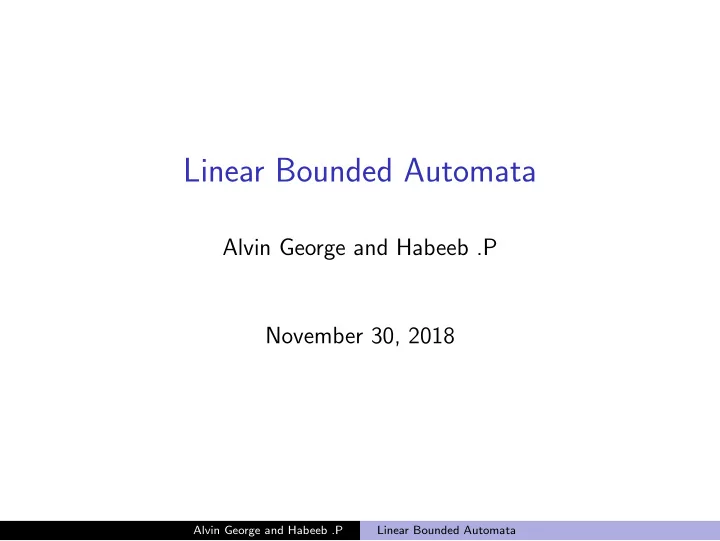

Linear Bounded Automata Alvin George and Habeeb .P November 30, 2018 Alvin George and Habeeb .P Linear Bounded Automata
Overview Definition Results about LBA Alvin George and Habeeb .P Linear Bounded Automata
Definition A Turing machine that uses only the tape space occupied by the input is called a linear-bounded automaton (LBA). Alvin George and Habeeb .P Linear Bounded Automata
Formal Definition A linear bounded automaton is a non-deterministic Turing machine M = ( Q , Σ , Γ , δ, s , t , r ) such that: There are two special tape symbols < and > (the left end marker and right end marker). The TM begins in the configuration ( s , < x >, 0). The TM cannot replace < or > with anything else, nor move the tape head left of < or right of > . Alvin George and Habeeb .P Linear Bounded Automata
LBA An equivalent definition of an LBA is that it uses only k times the amount of space occupied by the input string, where k is a constant fixed for the particular machine. Possible to simulate k tape cells with a single tape cell, by increasing the size of the tape alphabet. Used as a model for actual computers rather than models for the computational process. Alvin George and Habeeb .P Linear Bounded Automata
Examples { a n | n is a perfect square } repeat clear the 3 rd and 4 th tracks add another a to the 2 nd track copy the 2 nd track to the 3 rd track while there are as written on the 3 rd track delete an a from the 3 rd track add the 2 nd track’s a’s to those on 4 th track until overflow takes place or 4 th track = input if there was no overflow then accept Alvin George and Habeeb .P Linear Bounded Automata
Number of configurations Suppose that a given LBA M has q states, m characters in the tape alphabet , the input length is n Then M can be in at most α ( n ) = q ∗ n ∗ m n configurations i.e. With m symbols and a tape which is n cells long, we can have only m n different tapes. The tape head can be on any of the n cells and we can be executing any of the q states Alvin George and Habeeb .P Linear Bounded Automata
Results about LBA Theorem 1 The halting problem is solvable for LBA. Idea for proof The number of possible configurations for an LBA An LBA that stops on input w must stop in at most α ( | w | ) steps Corollary: The membership problems for sets accepted by linear bounded automata are solvable Alvin George and Habeeb .P Linear Bounded Automata
Results about LBA Lemma For any non-deterministic linear bounded automaton there is another which can compute the number of configurations reachable from an input. Idea for proof: Enumerate all possible configuration Check whether the NLBA can get to them for a given input ’ w ’ Alvin George and Habeeb .P Linear Bounded Automata
x = 0 for i = 1 tok ∗ n ∗ s n generate C i guess a path from C 0 to C i verify that it is a proper path if C i is reachable then x = x + 1 verify that x � m (otherwise reject) Alvin George and Habeeb .P Linear Bounded Automata
Results about LBA Theorem 2 The class of sets accepted by non-deterministic LBA is closed under complement. Idea for proof: Find out exactly how many configurations are reachable Examine all of them and if any halting configurations are encountered, reject Otherwise accept Alvin George and Habeeb .P Linear Bounded Automata
Results about LBA Lemma For every Turing machine there is a linear bounded automaton which accepts the set of strings which are valid halting computations for the Turing machine. Alvin George and Habeeb .P Linear Bounded Automata
Results about LBA Theorem 3 The emptiness problem is unsolvable for linear bounded Proof. If a Turing machine accepts no inputs then it does not have any valid halting computations. Thus the linear bounded automaton which accepts the Turing machine’s valid halting computations accepts nothing. This means that if we could solve the emptiness problem for linear bounded automata then we could solve it for Turing machines. Alvin George and Habeeb .P Linear Bounded Automata
References Previous years { 2011, 2013, 2016 } slides on LBA. Andrew Cumming, notes on ”Linear Bounded Automata”. Alvin George and Habeeb .P Linear Bounded Automata
Thank You Alvin George and Habeeb .P Linear Bounded Automata
Recommend
More recommend